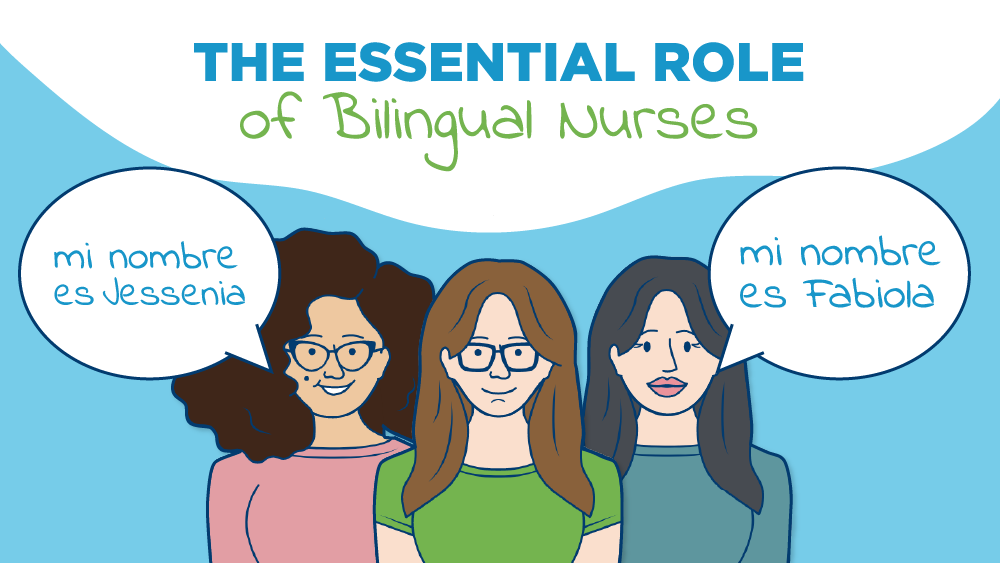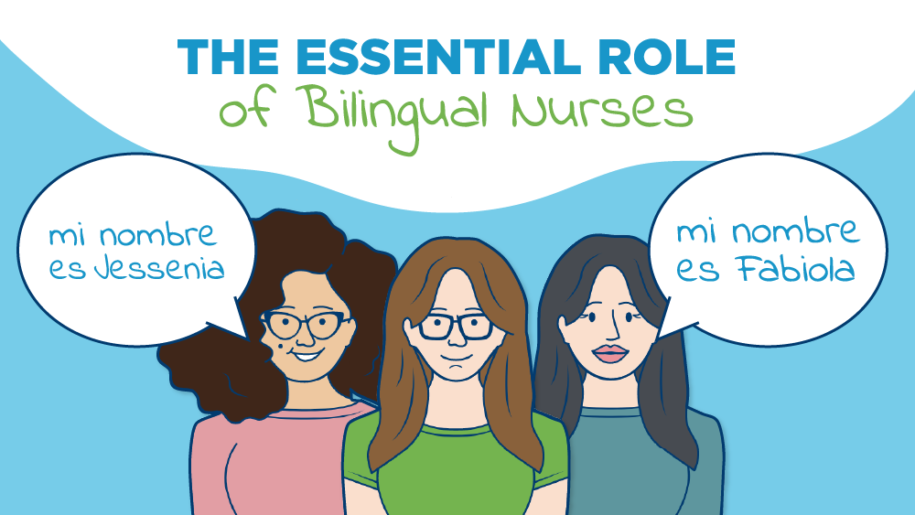
The Essential Role of Bilingual Nurses
America is a land of linguistic and cultural diversity, and over 350 languages are spoken across the nation [1]. In fact, nearly one in five Americans primarily speaks a language other than English in their daily lives [2].
Despite this linguistic diversity, however, patients who don’t speak English well are at a significant disadvantage when accessing healthcare services. An American Medical Association study found over 40% of patients with Low English Proficiency (LEP) speak with healthcare professionals without an interpreter—significantly increasing their chances of miscommunication and medical error [3].
Medical professionals need to be certain of patients’ conditions, symptoms and history when providing care, but how can they be without clear mutual understanding?
Bilingual nurses can alleviate the uneasiness patients with LEP feel when explaining their healthcare concerns and help them better manage their medical conditions.
How Bilingual Nurses Support Patients
Bilingual nurses eliminate the chances of miscommunication in medical scenarios, reducing the risk of error when administering care. From thoroughly collecting patients’ medical histories to carefully explaining aftercare protocols, they do more than close the language gap—bilingual nurses provide exceptional care to patients who wouldn’t get it otherwise.
Bilingual Nurses Clearly Define Patients’ Conditions
Communicating in healthcare scenarios can be a harrowing experience for anyone—even native English speakers. Up to a third of patients feel such strong anxiety in medical situations that they avoid going to the doctor by all means possible [4].
This palpable anxiety is amplified in patients who are uncomfortable communicating in English. Jessenia Lopez, an LPN with Signallamp Health, has personally seen patients forgo medical care, believing their lack of English meant their concerns wouldn’t be properly accommodated.
Jessenia recalls how, through conversing in their native language, she’s been able to “provide [her] Spanish-speaking patients the time and care they need to ensure all of their questions and concerns are being addressed to their satisfaction.”
For Jessenia, the chance to care for those who would otherwise have a difficult time communicating their experience is an extremely rewarding aspect of her career.
“There is a great deal of satisfaction felt when a patient calls in overjoyed because I was able to help them obtain their medications and a condition is improving,” she said.
And, without her Spanish skills, there’s no telling how long her patients would have gone without properly understanding their conditions. Understanding patients and helping them understand their own health is only the start for bilingual nurses, however.
Bilingual Nurses Help Patients Access Healthcare Resources
Anastasia Sokolova, a Russian-speaking RN with Signallamp, sees an evident discrepancy in the resources available to non-English speakers.
Anastasia notes that “patients who don’t speak English often have less resources available to them due to language barriers. Often, these patients have more difficulty navigating the system.”
It’s not just Anastasia who feels this way, either. According to Scientific American, this lack of non-English resources came to the immediate attention of the medical community during the COVID pandemic. During this time, medical professionals voiced concern over how the government failed to provide reliable information about the disease and vaccines in languages other than English [5].
COVID wasn’t the start of these discrepancies, however, nor will it be the end.
Oftentimes, medical professionals fail to take culture into account. For example, food is a central part of certain traditions. According to Anastasia, “Patients often feel that their providers just can’t understand how much of a sacrifice it is for them to make changes to their diet.”
Thus, Anastasia uses her dual language abilities to help patients feel “a connection to a medical professional that fully understands their culture and their struggles to navigate the system.”
Normally, cultural concerns would be written-off by everyday doctors and nurses in the interest of expediting care. At Signallamp, however, nurses bridge the gap between traditional sensibilities and medical necessity by providing education and showing legitimate concern for patient well-being.
Anastasia finds her job truly rewarding, partly because she’s “able to give patients the time they need to improve their care.” What makes Signallamp Health stand out, she said, “is the overall approach to and view of healthcare: patient first, business second.”
Bilingual Nurses Act as a Liaison Between Patients and Healthcare Professionals
Unfortunately, preconceived biases play a huge role in people’s lives and they can negatively affect proper healthcare treatment. Harvard Health has identified a number of factors alongside language, including race, gender and sexual orientation, that can affect access to care [6].
Fabiola Mondaca, our Bilingual Quality Improvement Coordinator, mentions how nurses at Singallamp “help patients navigate the healthcare system, provide education, and take on the role of social worker, and many times, the role of a confidant.” They are familiar with this ongoing struggle to receive proper care, and work passionately to rectify it.
To make sure her patients’ needs are met, Fabiola communicates with Primary Care Providers and specialists about their conditions. She believes working with Signallamp gives her “the ability to care for [Spanish speakers] beyond the 15-30 minutes afforded at their PCP visits.” Her extra effort pays off when her patients get the care they need and their providers are always up to speed on their conditions.
Pursue a Rewarding Nursing Career with Signallamp Health
Bilingual nurses are a crucial component of the American healthcare system. They help patients access proper care, regardless of the language barriers they face in their day-to-day lives.
If you’re a bilingual nurse who wants the opportunity to help others while building a rewarding career, apply with Signallamp Health. We provide the means for you to support your patients, earn a strong living wage and have time for your personal life as you work from home.
Apply to Signallamp Health and use your language and nursing skills to help patients receive the care they need and deserve.
Sources:
[1] “Census Bureau Reports at Least 350 Languages Spoken in U.S. Homes.” United States Census Bureau. November 3, 2015. [Online] Available: https://www.census.gov. [Accessed May 15, 2023]
[2] “What Languages Do We Speak in the United States?” United States Census Bureau. December 6, 2022. [Online] Available: https://www.census.gov. [Accessed May 15, 2023]
[3] “Language-Based Inequity in Health Care: Who Is the “Poor Historian”?” American Medical Association. March 2017. [Online] Available: https://journalofethics.ama-assn.org. [Accessed May 15, 2023]
[4] Taber, J. M., Leyva, B., & Persoskie, A. “Why do people avoid medical care? A qualitative study using national data.” Journal of general internal medicine, 30(3), 290–297. [Online] Available: https://doi.org/10.1007/s11606-014-3089-1. [Accessed May 15, 2023]
[5] Pooja Chandrashekar. “The Health Care System Is Shortchanging Non-English Speakers.” Scientific American. [Online] Available: https://www.scientificamerican.com. [Accessed May 15, 2023]
[6] “Racism and discrimination in health care: Providers and patients.” Harvard Health. January 16, 2017. [Online] Available: https://www.health.harvard.edu. [Accessed May 15, 2023]

